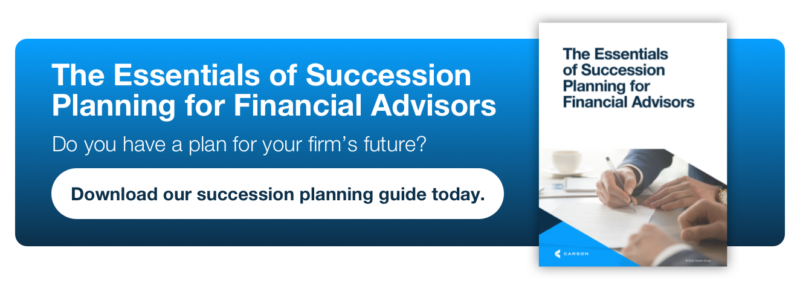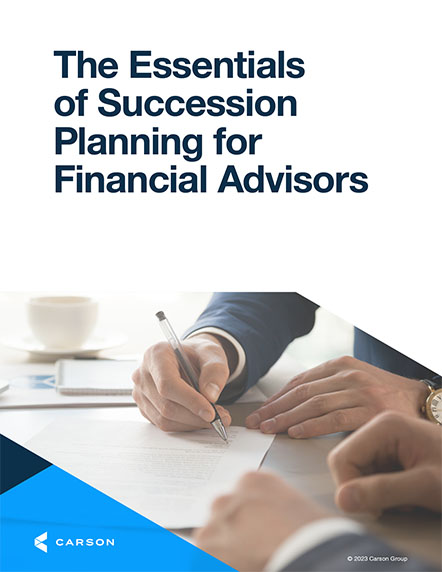As you run your financial advisory practice, in the back of your mind you realize you’re building a valuable business. But do you know just how valuable?
You could be pleasantly surprised. Market valuations of RIAs have roughly doubled over the past five years thanks to strong M&A demand from large-scale advisory practices, consolidators and private equity funds. In 2022, RIA M&A deal volume reached a new high. This record happened while overall M&A was slowing down, showing just how much demand there is in this sector.
Calculating your financial advisor valuation is important for several key situations. Of course, if you’re planning to sell your book of business, you need to know how much it’s worth. But before then, your valuation matters as you handle estate planning for your family, succession planning for your business or a potential buy-sell agreement to protect the continuity of your clients. And ultimately, understanding your valuation can help focus the growth of your firm to optimize for a future exit event.
If you’d like to check your financial advisor valuation, here’s how you can do so, as well as strategies to make that number even bigger for the future.
Table of Contents
- Online Tools and Rules of Thumb
- A Professional Valuation
- Getting the Best Valuation Possible
- Questions to Ask a Potential Buyer
- Planning Your Next Moves
Online Tools and Rules of Thumb
For a rough estimate of your firm’s valuation, there are some general rules of thumb based on financial performance. One simple, well-known rule has historically been “two times revenue.” So if your firm is bringing in $1 million a year in revenue, the book of business is worth roughly $2 million.
Another slightly more sophisticated calculation considers your EBIDTA (earnings before interest, depreciation, taxes and amortization). When professional buyers value, they use a range between four to 12 times EBIDTA. In general, the larger the firm, the higher the EBIDTA multiple.
However, multiples are often influenced by a number of qualitative and quantitative metrics. For example, a firm that has strong historical growth might receive a higher multiple than one that is flat or declining. And in the same way, a firm with an appropriately staffed team to support clients and growth will be worth more than one with a solo advisor.
There are also a number of free financial advisor calculators available online. For example, Carson’s calculator asks six quick questions like your AUM, your number of employees and your number of clients to estimate a range for your firm’s value.
All these estimates are still just estimates. In the end, value is in the eye of the beholder, because what your business is actually worth depends on what someone is willing to pay for it. Figuring this out is as much an art as it is a science. That’s why if you’re getting ready to sell, it makes sense to bring in a professional.
A Professional Valuation
You have a few ways to get a professional valuation, depending on your budget and goals.
An online valuation service: For a low-cost valuation, there are several firms that offer valuation services such as Truelytics or FP Transitions. Their estimates are typically more detailed than from a free financial advisor valuation calculator, and can provide a basis for estate planning, key man insurance policies and setting buy-in terms for new partners.
An RIA valuation specialist: If you want something more comprehensive, you could work with an RIA valuation specialist They can go over your firm to not only come up with a valuation, but also give you ideas to increase your future value.
A sell-side investment bank: An investment banker’s job isn’t to give you a financial advisor valuation, but rather to find a buyer for you. They wouldn’t charge an upfront commission. Instead, they deduct a percentage of the final deal value, typically around 6%. With an investment bank, you get to test the entire market to find a deal partner, which can help land a higher price. The drawback is the considerable fee coming out of your sales proceeds.
Getting the Best Valuation Possible
The biggest driver for valuation is organic growth. Buyers want to see you’ve created an engine to systematically and repeatedly acquire new clients. The more value that doesn’t depend on you being there, the more attractive your firm will be to sellers.
What sort of team and support structures do you have in place? And what measures will you take to make sure they remain in force after you leave? For example, have you discussed incentives with your advisors and other staff to stay on board after a sale?
Since many buyers base valuations on EBIDTA, trying to boost this metric could make sense, but only if it’s done wisely. While blindly cutting costs by slashing your team would technically improve your EBIDTA, smart buyers will look at the infrastructure and notice the problem.
Instead, try increasing EBIDTA by growing revenue in a sustainable way. For example, you’re teaching your next-gen advisors to both generate and then support new client relationships. This would help your financial advisor valuation far more than rushing to cut costs.
Questions to Ask a Potential Buyer
Whether you work with an investment bank, go through Carson’s M&A team or sell directly to another advisor, there are some questions you should ask while setting your financial advisor valuation terms.
What would drive a higher multiple for the value of my business? By knowing the key factors a deal partner prioritizes most, like total AUM vs. number of clients, you can see how well you match up with each one.
What is your typical deal structure to buy advisor businesses? Do they pay everything at close? Or is it spread out, like half at close with the remainder over the next five years? If there are any future conditions, like a minimum level of AUM growth, make sure that they are achievable given your past performance.
What will I need to do after the deal? Consider your own desired exit path. Are you looking to retire immediately, or would you like to stay around for a few more years? Ask what your role will be for the exit, and what kind of compensation they would offer. Deals typically include performance incentives and bonuses if you stay on.
How will you handle my clients after I leave? Will their fees change or remain the same? Will they receive the same level of service or better? Who will be in charge of engaging with them? If you’re leaving right after the exit, see that there’s a next-gen advisor ready to take your place as part of the deal. One of Carson’s goals after acquiring a book of business is to add value to the future client experience – for example, by giving them access to Carson’s industry-leading tech stack.
Planning Your Next Moves
Valuation isn’t something to fret over every day. Too much focus on multiples and future sale prices can distract you from the planning work needed to generate value in the first place. But it’s still an area that advisors should pay more attention to with periodic check-ins, even with an online financial advisor valuation calculator. That way, you can set goals and see your progress over time.
Whether you’ve got a sale coming up soon or many years away, Carson can help you determine the right succession plan for your business. This can range from finding ways to optimize your valuation, getting your next-generation advisors ready to buy you out or even directly acquiring your firm.
Whatever your needs, our M&A team is ready to discuss. The sooner you start planning, the more likely you’ll receive the valuation you deserve after years of hard work.




